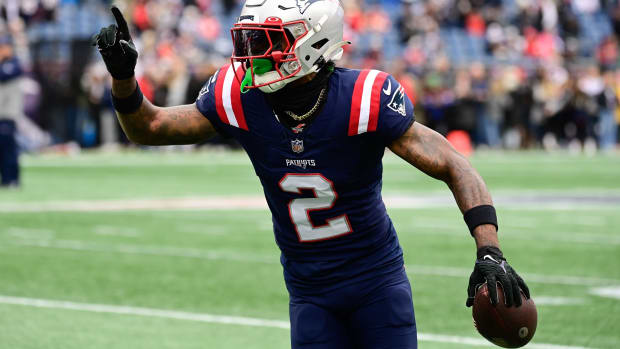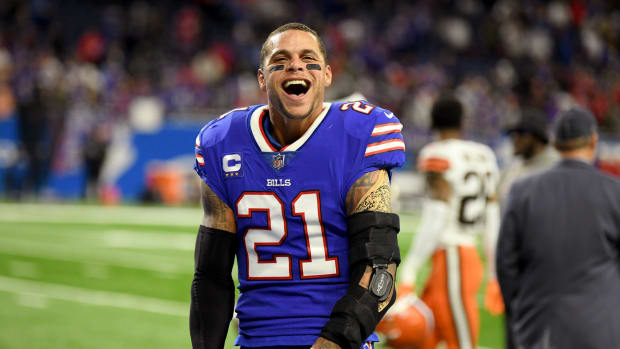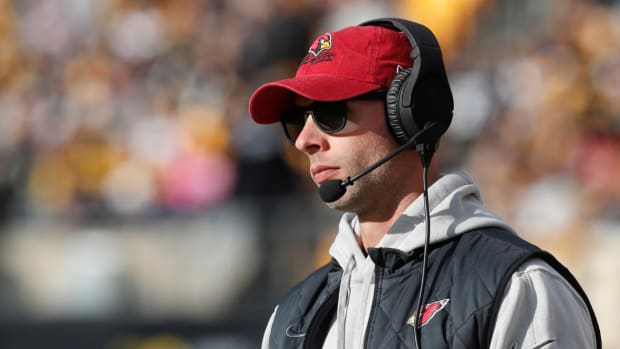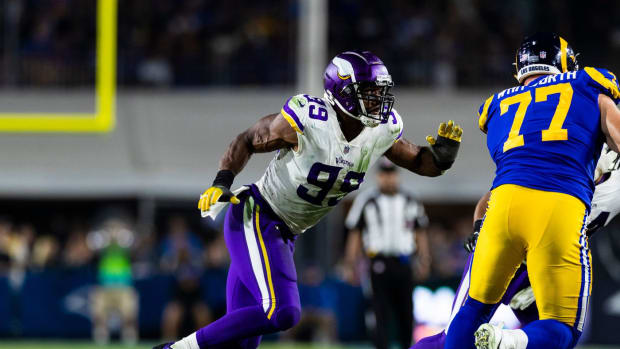Deshaun Watson, According to a Super Bowl Coach and Two NFL Quarterbacks
Deshaun Watson dazzled on Monday night. In leading Clemson to a stunning 35-31 win over Alabama, the quarterback flashed arm strength, shed tacklers (50 of his 72 rushing yards came after contact) and demonstrated mental and physical toughness that scouts have a hard time quantifying. In two national title games against Nick Saban’s supremely talented Alabama defense—featuring about a dozen potential NFL starters—Watson posted a spectacular stat line: 825 passing yards, 116 rushing yards, eight total touchdowns (seven throwing, one rushing) and one interception.
But as Watson heads toward the NFL draft, evaluators around the league believe his prospects are murky. At this point last year he was pegged as the top draft-eligible quarterback and probable No. 1 overall pick. Now he’s projected as the second or third quarterback off the board, with a ceiling of mid-to-late first round. Watson hasn’t regressed significantly over the past year, though he had a few shaky performances early and had patches when accuracy and/or decision-making weren’t great (especially near the end zone). One of the things that seems to be keeping Watson’s stock afloat is intangible: He just wins. “Quarterback wins” are a touchy topic at any level of football, but there’s no ignoring the fact that Clemson lost just two games over the last two years. “He’s played in big games, and he’s won in big games, and those are ultimately the things you’re going to fall in love with,” a scout told me in December.
So why the drop? As a veteran NFL scout told SI.com’s Pete Thamel last week: “He showed what he’s capable of doing against Alabama last year. That was his best game of the season. But I just don’t see him as the pocket passer like a lot of people prefer in our league.” Another NFL evaluator told me it’s as simple as other players emerging: At this point last year the question for 2017 was Watson or Miami’s Brad Kaaya. Then DeShone Kizer and Mitch Trubisky came along, becoming the shiny new objects of scouts’ affections.
To delve a little more into what Watson achieved against Alabama’s defense, and how he projects to the NFL, I asked three smart football minds to serve as The MMQB’s analysts: Four-time All-Pro Randall Cunningham, one of the NFL’s original dual-threat quarterbacks; three-time Super Bowl winning coach Mike Shanahan, whose experience with quarterbacks ranges from John Elway to Robert Griffin III; and current Cleveland Browns quarterback Josh McCown, who has been in the league since 2002 (and whose team might consider Watson with one of its two top-12 selections).
* * *
McCown: I don't watch a ton of college football. I obviously know about Deshaun because he’s one of the best college players in the nation, but [the national title game] was my first time really watching him closely and I was very impressed with his skill set and his poise.
Cunningham: I’ve heard a lot about Deshaun Watson, but I’m not into the hype. What I like is: Kids who have good character. When I watch Watson play, I see a team player and a guy who is humble. On the field, look at his demeanor. He’s very focused, but he’s also having fun playing the game and that’s something I’d want to have in my quarterback if I’m running a franchise. A lot of people don’t know how to have fun out there, they put too much pressure on themselves or let the pressure get to them. That’s not Watson.
Shanahan: I don’t know too much about the intangibles but from afar my initial impression is that he’s a fantastic guy. The way he handles himself, his answers in the post-game interview, those were all positive.
McCown: The thing I liked most [on Monday] was that he started slow, and he overcame it. As the game got tighter, he played better. When scouts are at the game, they’re watching him the whole time: his demeanor on the sideline, how he’s interacting with coaches and teammates. Watching from TV, I thought, he must be doing something good on the sideline because he was playing at such a high level down the stretch. In the NFL, players who play at a high level and play for a long time, they find a way to do that.
Cunningham: He has a lot of poise. He has the poise of an NFL veteran, really. He’s a field general. He doesn’t rush, he’s patient. You can’t teach that, it’s innate. He reminds me of myself when I had come back from a knee injury. I had a brace on my knee and people said, Well, now he’s going to be limited. Great players figure out ways, no matter circumstance.
Shanahan: Anytime you beat Alabama the way he did, you’re going to get people really excited—and rightfully so. He put up a lot of yards in both of his games against Alabama, and that’s a great defense.
Cunningham: You can talk about him as a runner or how well he runs all day, but he has a very strong arm. I think he definitely has the arm strength you’re looking for, and really that you need to be an NFL quarterback.
Shanahan: He has a good release. He has the ability to make all of the throws. That's the first thing you look for.
McCown: The NFL game and the college game are becoming very different. We’ve seen so many Heisman Trophy winners come in, and don't do as well in the NFL. But with Deshaun, I actually think the NFL game could help him a little bit. In college, some of the throws you are asked to make are different—because of the nature of the field, the hashes, the run pass options. When you have the arm strength, which Deshaun certainly does, some throws that maybe he’s not been asked to make yet, he’ll be asked to make in the NFL. And maybe he’s really good at those. Just look at recent history. Dak Prescott, I know he did great things at Mississippi State, but he flew under the radar a little bit, and then he gets in the pro game and it’s like, Wait a minute, he can make that throw? He can make this throw?
Shanahan: What does Deshaun Watson have to do to be an elite quarterback? What he’ll have to do, eventually, is when he drops back, he has to read the whole field and not just one side of the field. The way you can do that is you need to focus on your coverage and the concepts that are going on. When a guy has the ability to run, that’s O.K., but when he’s approaching the line of scrimmage he has to keep his eyes downfield before he crosses the line of scrimmage to see if there’s an open receiver. If you miss him, well now they’re looking at you to make a seven-yard gain. But, as you’re looking down field as you approach the line of scrimmage and everything is covered, use your athletic ability and slide before somebody hits you. When the pocket collapses a little bit, he steps up and looks for the hole, and he’s looking to escape to one of those holes. In time, what he’ll learn is to slide and step up in the pocket, slide into those holes where he can still keep his focus downfield. If you don’t do that, you don’t last in the NFL.
McCown: When you have an asset like your legs, like Deshaun has, and it's part of your game and your skillset, you have to utilize it. Whatever team he goes to, you don’t want it to stunt his growth. You don’t want him to rely on it so much that it limits him as a passer. A lot of times, you’ll see with mobile quarterbacks, they come in and find ways to move the football and move their team with their legs. It stunts their growth as a passer, and then when the time comes that maybe they’re not as fast, or have an injury, or teams catch up to them a little bit, they’re not able to win games with their arm. Tom Brady is case in point that there’s still such a premium to play from the pocket and with accuracy, because you can play for so long. That’s the biggest balance for Deshaun as he comes into the league. It’s hard because it’s such a win-now league. Coaches in the NFL will say, Well we can do all of these RPOs (which we run to an extent in the NFL) and we can do this that and the other and move the football with him. That’s great, but are you risking his growth as a passer because of it?
Shanahan: I think the ability to run is always good, but you’re not going to outrun people in the National Football League. And if you do, you’re going to wind up getting hurt. But what it allows you to do is have the ability to buy time and make big plays. Sometimes the ability to run can be a hindrance because a lot of guys will take off and run and they don’t focus their eyes downfield; they’re focusing their eyes on where the holes are, Where am I going to run to? If you get into the NFL, and you have the God-given ability that Deshaun does to make some plays with your legs, as you’re approaching the line of scrimmage you have to be looking downfield. You have to do that because you want the ball to be thrown if you do run, and you can’t take the hits like he took [on Monday night]. He won’t be around in the NFL if he keeps taking those shots. He needs to learn how to slide in those situations. On a college team, when you’re playing for a national championship, you understand why he’s not sliding, you understand why he’s making the plays. But as he gets to the next level, he’ll have to understand his importance to his football team. That one play is not going to be the difference in your year. He’ll need to be smarter about when to go, because he needs to stay healthy.
McCown: Everybody made a big deal of that hit that spun him around. I’ve actually [received] a hit that spun me around like that. [In Week 1 of 2015 against the Jets, McCown scrambled toward the end zone, collided with two defenders, and fumbled the ball. He left the game with a concussion.] I think that's absolutely something he needs to be aware of. In this league, what wins games and moves teams is arm talent and accuracy. Mobility is a plus, and it can be part of it, but your best ability is your availability. That’s one of the things I’ve been most impressed with Dak Prescott. When he moves and runs, he goes and gets down and protects himself. That’s a veteran move, something I wish I learned earlier in my career.
Shanahan: It takes a while to learn to be a pocket passer. You can tell that he struggled a little bit with the intermediate and deep routes. That does take some time. Your footwork in the pocket, your ability to slide in the pocket, instead of just taking off and looking downfield or looking at the holes in the defense where you can keep your head up and still slide and still focus downfield. And key the whole defense? That takes time. That doesn’t happen overnight. So that’s something he is going to have to work on.
Cunningham: I think he could play right away if a team needs him, but it’s always my preference to have a rookie sit and learn behind a veteran. Maybe it’s only for the preseason or a few games, but you never want to rush someone out there too soon.
McCown: The back shoulder throw on that last drive was my favorite play. He threw one down the middle to No. 13 [Hunter] Renfrow—who, side note, I think is going to play in the NFL for a while, that kid impressed me too. But that throw, that’s not an easy ball to complete. It was a bender seam throw that he made, and I thought, Man, that's an impressive, NFL throw.
Cunningham: That last play of the game, I knew that it was coming. I had seen what [Alabama] had done previously to try to stop them. They were playing a zone, faking blitz, rushing five, but they were playing a zone. So Clemson ran the old roll out— that's an NFL play. When you roll out, because blitz may be coming, and it’s a quick decision. Deshaun threw a perfect pass to his receiver. They should’ve called pass interference on the defense for slamming the receiver on the outside as he ran his slant route, but it was just a perfect play.
Shanahan: In evaluating him, the first thing you’d do as an NFL coaching staff is go back the last couple years and look at his interceptions. He didn’t have any [on Monday] but you’ll look back at any he’s had and say, What does he have to do to eliminate those turnovers? See if he can recognize that by watching film and understanding it, and applying it. Some guys are never able to do it, other guys are.
McCown: For any college player, but Deshaun especially, I think it’ll be important to continue to be more consistent with the football and accuracy and decision-making. That will come as he grows. When you get to this level, accuracy is a premium. For guys to stay consistently at a high level is to put the ball where you want it.
Cunningham: After the game, Dabo Swinney said, “I told you that’s the best college football player in America.” He is, but he’s an NFL player. When you get into big games, you find out who the real players are. He proved, in beating Alabama, he’s the real deal. Deshaun Watson and NFL? Yeah, no doubt about it. Watson is a first-round draft pick in my eyes, easily.
* * *

Jabrill Peppers is part of a wave of redshirt sophomores in the 2017 draft class.
Leon Halip/Getty Images
FIVE THINGS YOU NEED TO KNOW
Recapping the top college and draft-related storylines of the past week…
1. The national title game lasted 4 hours, 8 minutes, making it the longest title game since the BCS was introduced in 1998. It’s not an anomaly. College football games are getting longer. The average college football game in 2016 was three hours and 24 minutes—seven minutes longer than it was four years ago. We may have reached a tipping point. Those in power are aware that longer games are problematic. Pac-12 commissioner Larry Scott and SEC commissioner Greg Sankey are among those who have publicly advocated addressing the issue. (In my opinion, one of the easiest fixes is eliminating clock stoppages after first downs.) It reminded me of a conversation I had with Mike Mulvihill, FOX Sports’ Senior VP of Programming, Research and Content Strategy, in November on college football ratings. Here’s Mulvihill on the issue of college football’s increasing game length, from a network perspective: “On the most practical level, it does make our jobs a little bit more difficult in that we’re looking for as many opportunities as we can to do triple headers, especially on the cable side. When you face a regular possibility of games not going only beyond 3 1/2 hours but in some cases beyond four hours, it does make the nuts and bolts of our job much more difficult. Philosophically, something we talk about around here a lot is the biggest pressure we face is the competition we’re in for people's time. There are so many distractions out there, entertainment programming, news programming, things you can be distracted by on your phone or other forms of entertainment. We face a lot of pressure to sustain people’s attention for a sustained period of time. What we’ve observed is, over the last five years the sports trending in a positive direction, especially among young people, are the sports that ask a little bit less of your time. Baseball is aware of the challenges they face in pace of game. NASCAR is up against that. Golf is up against that. And now perhaps football is too. When you’re in this environment where time is of the essence, it’s an issue we think about a lot.”
2. Here’s another draft trend to keep an eye on: It’s the year of the redshirt sophomore. Last year, seven redshirt sophomores declared for the draft. Two went in the first round (Ohio State corner Eli Apple, No. 10 to the Giants, and Buckeyes linebacker Darron Lee, No. 20 to the Jets), one went second round (Clemson cornerback Mackensie Alexander, No. 54 to Minnesota), one went third (Stanford tight end Austin Hooper, No. 81 to Atlanta) while three went undrafted (Auburn running back Peyton Barber, Bowling Green wide receiver Roger Lewis, Ohio State wide receiver Jalin Marshall, all of whom latched on with teams). This year, expect a much more successful redshirt sophomore class. So far, I’ve counted seven redshirt sophomores who have declared or are thinking about declaring, who have first-round grades: Ohio State safety Malik Hooker, Alabama cornerback Marlon Humphrey, Notre Dame quarterback DeShone Kizer, Ohio State cornerback Marshon Lattimore, Oklahoma running back Joe Mixon*, Michigan’s do-everything safety Jabrill Peppers, Stanford defensive end Solomon Thomas. (For more on Mixon, see item No. 3). A few things intrigue me here. There’s a micro-trend about the redshirt sophomore quarterback. Kizer is now the third redshirt sophomore QB in the last four years who could become a first-rounder—joining Jameis Winston in 2015 and Johnny Manziel in 2014. Though eligibility rules have changed, this is really a new phenomenon. Prior to Manziel, only four redshirt sophomore quarterbacks were drafted in the first round since 1970. As for the other position players, I asked a few people I knew in the NFL to explain the uptick. One person categorized this as simply a talented group, while someone else pointed to the Collective Bargaining Agreement’s rookie wage scale. “The ceiling is lower on first-round contracts and more emphasis on earning power in a second contract,” the evaluator said. Thus, some players are being advised to enter the league with one less year of wear-and-tear from college, knowing they will be one year younger in the four or five years their rookie deal expires and more attractive for a big second contract and potentially an even bigger third contract.
3. Oklahoma running back Joe Mixon is entering the draft; he says he received a first-round grade from the NFL Advisory panel. There’s no question Mixon has first-round talent, but I would be shocked if he is taken in the first two rounds. He might not go by the third round either. A quick refresher for the uninformed: During an altercation in 2014 Mixon punched a female student, fracturing four bones in her face; he was charged with misdemeanor assault, and entered a plea that involved fines and community service, but no jail time. The entire ordeal is steeped in controversy, in large part due to the leniency handed down by OU coach Bob Stoops, and because until a few weeks ago Mixon hadn’t publicly expressed remorse. Over the next few months, Mixon will be compared to Chiefs rookie wide receiver Tyreek Hill, who in 2015 pleaded guilty to domestic abuse by strangulation. Some teams removed Hill from their draft boards entirely, though the Chiefs took a chance in the fifth round after GM John Dorsey said he did due diligence and believed Hill was on the right path. You’ll hear people debate the weight of visual evidence (Mixon’s incident was captured on video; Hill’s was not) and really, this is about optics. Mixon will embark on a personal campaign to prove to NFL teams that not only can he be trusted to stay out of trouble, but they can trust him to represent the franchise in front of their fans and community. Another thing to remember with Mixon: The running back will be included in the NFL’s recently revised personal conduct policy. As a rookie, he cannot be punished for conduct that occurred in college, but he can be considered a repeat offender if a similar incident occurs after he is in the league.
4. Last year there were a record 107 underclassmen to declare for the draft, and with a week until the deadline, I have already counted 80 on the books. The NFL will announce the official list on Jan 20.
5. It’s not too early to start thinking about the 2017 college football season. The four national championship semifinalists (Alabama, Clemson, Ohio State and Washington) are each expected to return as Top 10 teams, but keep an eye on Florida State, Oklahoma, Penn State and USC as early favorites to threaten. Speaking of the Trojans, one player I’m definitely monitoring next season is quarterback Sam Darnold. His coming out party in the Rose Bowl culminated a season during which NFL evaluators buzzed about his poise. And as a redshirt sophomore next year, he could be the early leader of the 2018 quarterback draft class, joining Louisville’s Lamar Jackson and UCLA’s Josh Rosen.
* * *
FACTOID OF THE WEEK
Per Peter Burns of ESPN: In the national title game, Alabama failed to convert a third down in the last 3 hours and 37 minutes of real time (8:49 p.m. to 12:28 a.m. ET).
Question or comment? Email us at talkback@themmqb.com.





































